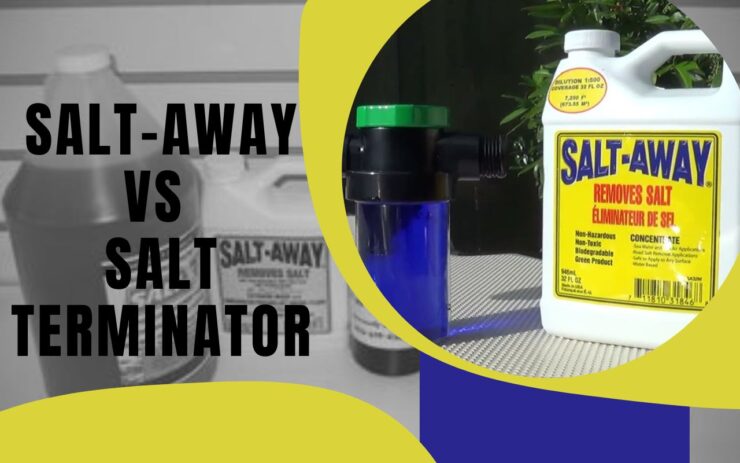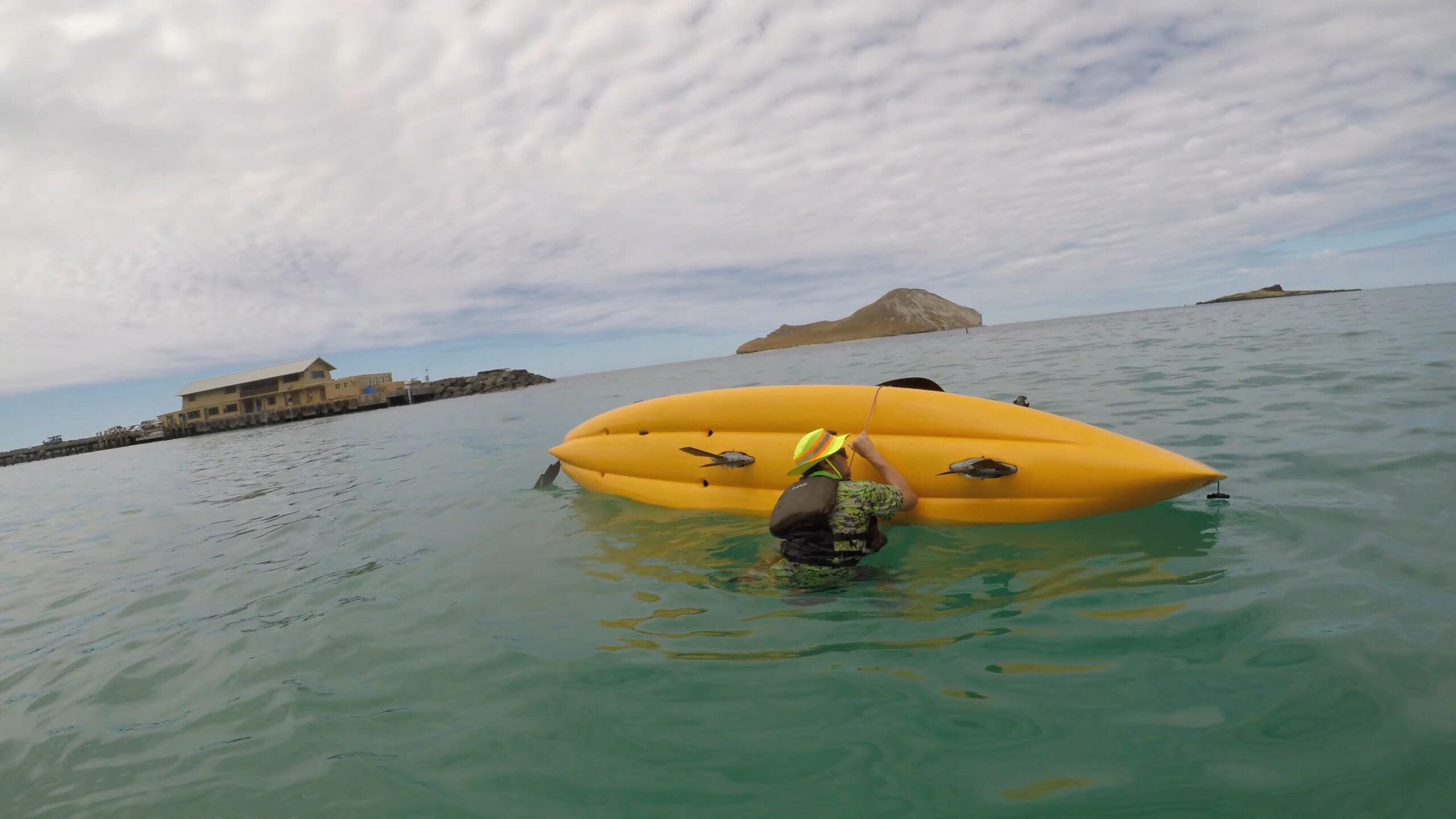So you may regularly go out to the saltwater for fishing or entertainment.
Suddenly, one day you noticed some salt corrosion had made its way home on your boat.
Now you definitely need a salt remover to clean off the corrosion.
So, which one should you choose between Salt Away vs Salt Terminator?
Salt-Away needs less solution to be mixed with water than Salt Terminator.
Also, Salt Terminator costs a lot less. Salt-Away is also a little bit harsher on salt than Salt Terminator.
However, both of them take around 5-10 minutes to sit before rinsing.
Can’t choose your fighter yet? To help you with that, we’ve explained everything in detail. So, head over to choose yours!
Table of Contents
ToggleSalt Away vs Salt Terminator: Quick Differences Spotted
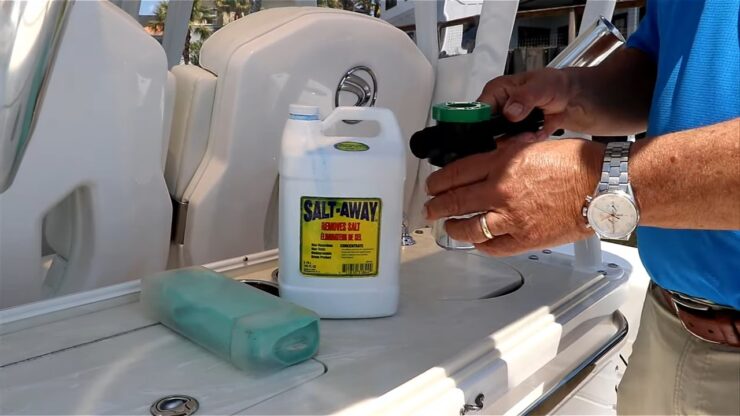
Let’s take a quick look at the differences between Salt-Away and Salt Terminator. Then we’ll be moving forward to the details
| Features | Salt Away | Salt Terminator |
| Dilution ratio | 500:1 | 32:1 |
| Price | Less | More |
| Safety | More | Less |
| Protective Coating Lasting Period | More | Less |
| Effectiveness | More | Less |
Spoiler alert, this was just the tip of the iceberg. We’ll be learning the details of these two salt fighters as we move forward. So what are you even waiting for?
Salt Away vs Salt Terminator: Head-to-Head Comparison
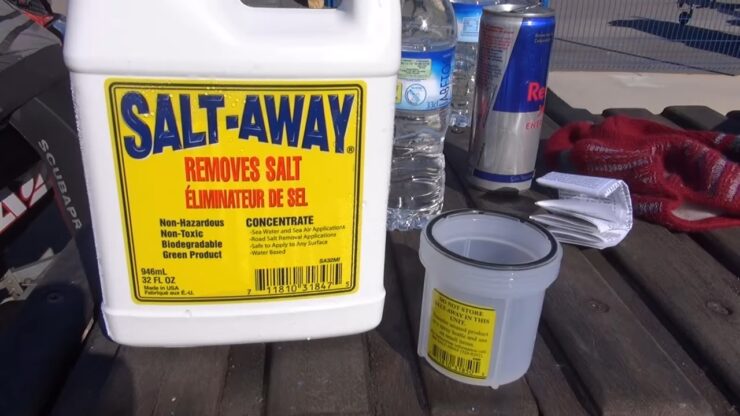
Choosing a boat cleaner can be as confusing as choosing the boat itself like sea ray vs bayliner.
There are a lot of differences and some similarities as well.
For instance, the resting period of these products is the same.
First, you need to apply Salt-Away or Salt Terminator on the engine or the cleaning surface.
Then they need to sit on the surface for some time to dissolve with the salt corrosion.
The amount of time they need to rest is for at least 10 minutes.
If you think that the corrosion is thick, add more solution than usual. Then let them sit for 20-30 minutes.
Because if not removed properly, corrosion can cause great damage to the metals.
Now let’s get back to the differences.
To ease your pain, we’ll explain the features of both salt fighters. This will help you choose the one you need.
Price
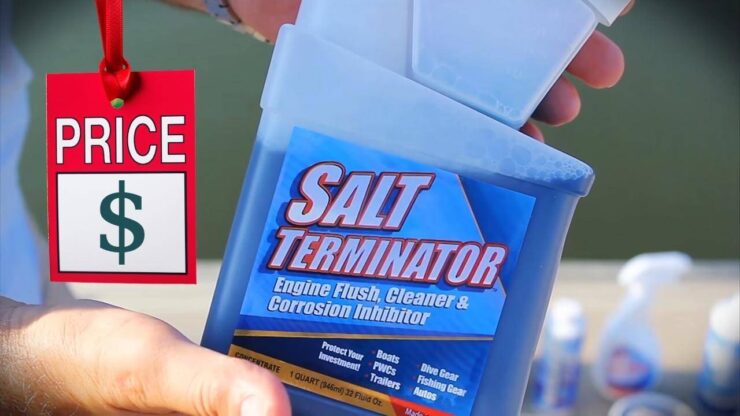
Here comes the big question, “how much do Salt Away and Salt Terminator cost?”
Good news for you, none of them would cost you a fortune. 32oz of Salt away will cost you around $21.
On the other hand, a 32oz Salt Terminator costs only $24.
However, there are different sizes of packages you can choose from.
We just mentioned the 32oz to just show you the comparison.
Is that all about the pricing? Definitely not! Let’s dive a little bit deeper.
Let’s do some quick math here. The manufacturer suggests a 32:1 ratio of Salt Terminator.
This implies that you have to mix 31.25 ml of Salt terminator with 1 liter of water.
So, you can use 32oz Salt-Away with 500,000 liters of water.
On the other hand, 32oz of Salt Terminator can be used with 32,000 liters of water.
You do understand now that you can use the Salt Away for a really really long time.
Salt-Away will cost you almost 15 times less than Salt Terminator in cumulative calculation!
But there’s another concern regarding the ratio.
If you’re applying salt removers on horizontal surfaces, you may need to reform the ratio.
In the case of Salt Terminator, mix 100-150 ml of the solution with 1 liter of water.
But for Salt-Away, add 40-60 ml of the solution to 1 liter of water.
You may wonder “why would I need to add more solutions for horizontal surfaces?”
Well, both Salt-Away and Salt Terminator create a thick solution when mixed with water.
When the solution is applied on the upper surfaces, it can sit without any pressure of gravity.
But when applied to horizontal surfaces, the solution starts to fall down.
So, when you mix more solution into the water, the new solution gets thicker.
As a result, it can stick to the horizontal surface better.
Protective Coating Lasting Period
There is another interesting feature regarding these two fighters and that is a protective coating.
Both Salt-Away and Salt Terminator don’t only fight the existing salt corrosion.
In fact, they leave a protective coating on the area you’ve cleaned.
So, if you apply either on your quality Mercruiser prop, it’ll prevent corrosion in the future too!
It has been tested that Salt-Away can reduce the salt removal maintenance time by 75%!
However, the Salt Terminator also creates a coating but it doesn’t last long like Salt-Away.
Effectiveness
Both Salt-Away and Salt Terminator take around 5-10 minutes to remove the salt.
However, it has been tested that Salt-Away can fight the salt better than Salt Terminator.
Because we need less Salt Away than the Salt terminator for cleaning the same surface.
Salt away uses comparatively harsher cleaning chemicals than Salt Terminator. As a result, it can fight off salt better.
Safety Concerns
Both Salt-Away and Salt Terminator are made with biodegradable ingredients.
However, there is some concern regarding the safety issue.
We don’t want to start a chemistry lesson here.
But Salt Terminator is more dangerous than Salt Away when it comes in contact with the body.
If the Salt Terminator touches the skin, it may cause itching.
If it gets into your eyes, you could get burning eyes. It’s because of the chemical ingredients of the product.
But Salt Away won’t cause any damage if used near children, pets, or gardens.
However, it’s still recommended to not come into direct contact with the product.
Salt-Away vs Salt Terminator: Our Recommendation
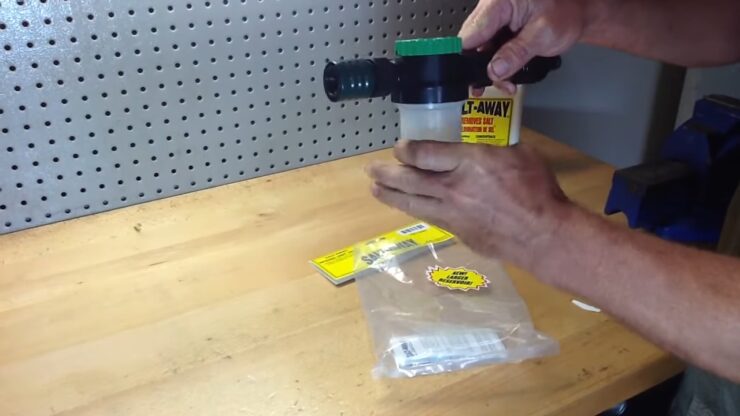
From the discussion above, we believe you already know who our winner is.
That’s right, Salt-Away wins this race by a mile! It beats Salt Terminator in every aspect of salt fighting.
While on the other hand, Salt Terminator comparatively costs more.
Also, Salt Terminator is less efficient and has more safety issues.
So, we would recommend you to go for Salt Away too for better cleaning.
But you’re still free to choose your fighter though!
However, to protect your bilge, you can use some good bilge paints in the first place.
This will prevent your boat from corrosion in the first place.
FAQs
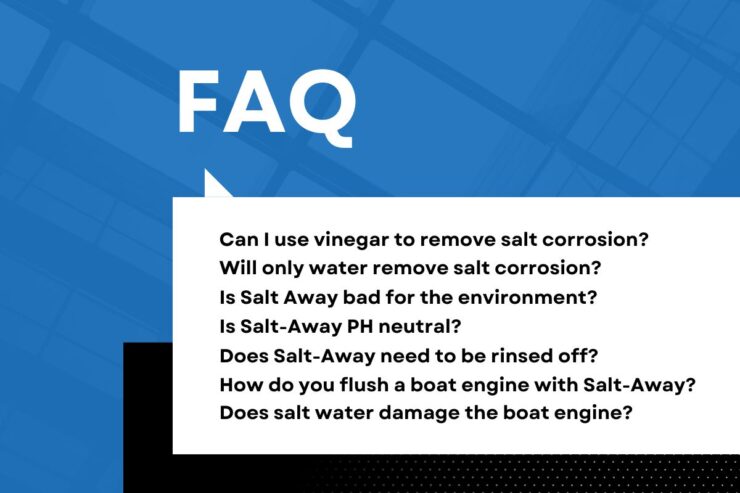
Can I use vinegar to remove salt corrosion?
Yes, you can. You need to mix ¼ cup of salt per liter of white vinegar and soak the rusty metal in it. This can be very costly you can see. So it’s better to use cleaners for large areas.
Will only water remove salt corrosion?
Using only water to remove salt corrosion may work to some extent. But it won’t make any significant difference like the cleaners do.
Is Salt Away bad for the environment?
No, Salt-Away is made with ingredients that are environment-friendly and 100% biodegradable.
Is Salt-Away PH neutral?
Yes, Salt-Away is pH neutral and will not damage your boat’s gel coat or paint. It is safe to use on all boat surfaces including aluminum, fiberglass, and painted surfaces.
Does Salt-Away need to be rinsed off?
If you are using Salt-Away on saltwater or brackish water, it does not need to be rinsed off.
The product will actually continue to work for up to 72 hours after application.
However, if you are using Salt-Away on freshwater, it is important to rinse the product off after use.
How do you flush a boat engine with Salt-Away?
If you have a saltwater boat, it’s important to flush the engine with Salt-Away after every use.
This will help remove salt and other corrosive materials from the engine, which can lead to damage over time.
To flush the engine with Salt-Away, simply add the recommended amount of product to a bucket of freshwater.
Then, run the engine for several minutes, circulating the solution through the system.
Finally, turn off the engine and allow it to cool before flushing with fresh water.
Does salt water damage the boat engine?
Salt water is one of the most corrosive substances on earth and it can cause serious damage to boat engines.
When salt water comes into contact with metals, it creates an electrolytic reaction that can eat away at the metal and cause corrosion.
This corrosion can eventually lead to engine failure.
Additionally, salt water is also very abrasive and can damage engine components by grinding away at them.
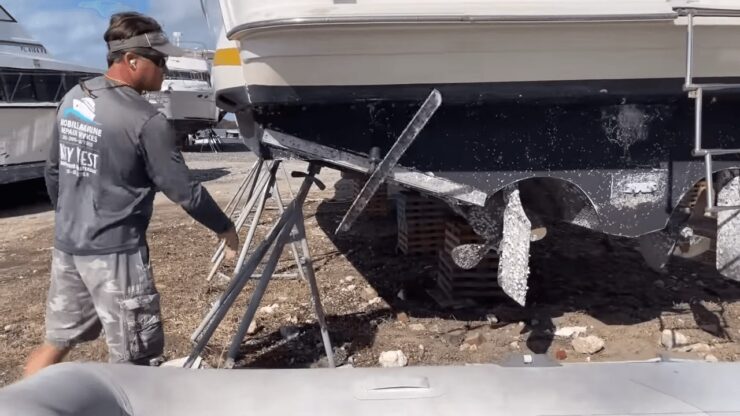
Bottom Line
As we’re here, we hope you have decided your winner between Salt Away vs Salt Terminator.
Always remember to fight off the corrosion to ensure the maximum health of your boat.
If you want to share anything with us or have any queries, feel free to leave a comment.
Till then, take good care of your boat!
I’m Liam Jackson, the proud owner and driving force behind KayakPaddling.net. Born somewhere in the expansive beauty of the United States, I’ve nurtured a lifelong passion for kayaking and fishing that has led me to explore the far corners of our nation’s waterways.
Related Posts:
- 10 Best Fish Hook Removers 2024 - Top Options for…
- 16 Best Kayak For Beginners 2024 - Kayaking Adventure Gear
- 12 Best Beach Wagons & Carts 2024 - For All-Terrain
- How to Stay Safe on Slow Moving Waters When Paddle Boarding?
- 10 Best Fish Finders Under $200 2024 - Top Affordable Picks
- 13 Best Fishing Kayak Under $500 in 2024 -…

